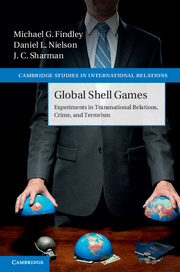Book contents
- Frontmatter
- Dedication
- Contents
- List of Figures
- List of Tables
- Preface
- 1 Introduction
- 2 Explaining the global shell game
- 3 Overall compliance, tax havens, OECD and developing countries
- 4 Terrorism and corruption
- 5 Laws and standards
- 6 Penalties, norms, and US origin
- 7 Conclusion
- Appendices
- References
- Index
- References
References
Published online by Cambridge University Press: 05 June 2014
- Frontmatter
- Dedication
- Contents
- List of Figures
- List of Tables
- Preface
- 1 Introduction
- 2 Explaining the global shell game
- 3 Overall compliance, tax havens, OECD and developing countries
- 4 Terrorism and corruption
- 5 Laws and standards
- 6 Penalties, norms, and US origin
- 7 Conclusion
- Appendices
- References
- Index
- References
- Type
- Chapter
- Information
- Global Shell GamesExperiments in Transnational Relations, Crime, and Terrorism, pp. 226 - 243Publisher: Cambridge University PressPrint publication year: 2014

